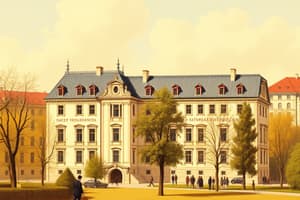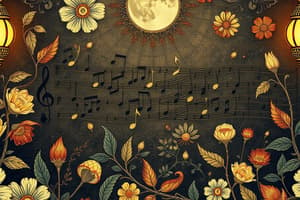Podcast
Questions and Answers
What does the term 'pizzicato' specifically refer to in string instrument playing?
What does the term 'pizzicato' specifically refer to in string instrument playing?
- Producing sound through harmonics
- Using a bow to play strings
- Playing with the aid of a conductor
- Plucking the strings with fingers (correct)
Which of the following best describes what 'crescendo' means in music?
Which of the following best describes what 'crescendo' means in music?
- Maintaining a steady volume
- Gradually getting softer
- Playing at a very fast tempo
- Gradually getting louder (correct)
Which statement accurately describes the difference between 'staccato' and 'legato'?
Which statement accurately describes the difference between 'staccato' and 'legato'?
- 'Staccato' is played smoothly while 'legato' is detached
- 'Staccato' refers to detached notes, while 'legato' refers to smooth, connected notes (correct)
- 'Staccato' requires a bow on string instruments
- 'Staccato' is slower than 'legato'
Who is recognized as the first prominent composer of opera?
Who is recognized as the first prominent composer of opera?
In music terminology, what does 'ritardando' indicate?
In music terminology, what does 'ritardando' indicate?
What elements does an opera typically include?
What elements does an opera typically include?
What is a defining characteristic of a 'trill' in music?
What is a defining characteristic of a 'trill' in music?
During which historical period did the Baroque music era occur?
During which historical period did the Baroque music era occur?
What instrument is associated with Apollo?
What instrument is associated with Apollo?
Which of the following is a characteristic of the aulos?
Which of the following is a characteristic of the aulos?
Which of the following is NOT one of the medieval composers associated with Notre Dame?
Which of the following is NOT one of the medieval composers associated with Notre Dame?
What is the primary distinction between a concerto and a symphony?
What is the primary distinction between a concerto and a symphony?
Which two instruments were widely used before the invention of the piano?
Which two instruments were widely used before the invention of the piano?
What does the term 'pizzicato' refer to in string instrument playing?
What does the term 'pizzicato' refer to in string instrument playing?
Who is credited with the invention of solfege?
Who is credited with the invention of solfege?
Which voice part is typically considered the highest?
Which voice part is typically considered the highest?
What string technique is referred to as 'double stops'?
What string technique is referred to as 'double stops'?
Which of the following is considered a Baroque composer?
Which of the following is considered a Baroque composer?
What is the primary purpose of a requiem in music?
What is the primary purpose of a requiem in music?
Which term describes the technique of playing a string instrument using a bow?
Which term describes the technique of playing a string instrument using a bow?
Which of the following musical periods occurred immediately after the Renaissance?
Which of the following musical periods occurred immediately after the Renaissance?
In music, what does the term 'diminuendo' indicate?
In music, what does the term 'diminuendo' indicate?
What is the effect of 'accelerando' in a musical piece?
What is the effect of 'accelerando' in a musical piece?
Which notable composer is recognized for works like 'Madame Butterfly' and 'La Boheme'?
Which notable composer is recognized for works like 'Madame Butterfly' and 'La Boheme'?
What does 'legato' indicate in music performance?
What does 'legato' indicate in music performance?
What is a defining characteristic of an oratorio in comparison to opera?
What is a defining characteristic of an oratorio in comparison to opera?
Which composer is NOT associated with the Renaissance period?
Which composer is NOT associated with the Renaissance period?
What type of instrument is the lute classified as?
What type of instrument is the lute classified as?
Which voice part is typically the lowest among the six human voice parts?
Which voice part is typically the lowest among the six human voice parts?
What distinguishes a concerto from a symphony?
What distinguishes a concerto from a symphony?
Which of the following best describes a cantata?
Which of the following best describes a cantata?
What does the term 'melismatic' refer to in music?
What does the term 'melismatic' refer to in music?
Which instrument is characterized as an aerophone and often associated with Dionysus?
Which instrument is characterized as an aerophone and often associated with Dionysus?
What is the primary sound production method for a piano?
What is the primary sound production method for a piano?
Who is credited with popularizing congregational singing during the Reformation?
Who is credited with popularizing congregational singing during the Reformation?
What type of instrument is a trumpet classified as?
What type of instrument is a trumpet classified as?
Flashcards
Concerto
Concerto
A musical composition featuring a solo instrument accompanied by an orchestra.
Pizzicato
Pizzicato
A technique in string instruments where the strings are plucked with the fingers instead of using a bow.
Crescendo
Crescendo
A gradual increase in volume, creating a build-up of intensity in music.
Opera
Opera
Signup and view all the flashcards
Recitative
Recitative
Signup and view all the flashcards
Aria
Aria
Signup and view all the flashcards
Monteverdi
Monteverdi
Signup and view all the flashcards
Musical Periods
Musical Periods
Signup and view all the flashcards
Apollo and the Lyre
Apollo and the Lyre
Signup and view all the flashcards
Dionysus and the Aulos
Dionysus and the Aulos
Signup and view all the flashcards
Origin of Chants
Origin of Chants
Signup and view all the flashcards
Notre Dame Composers
Notre Dame Composers
Signup and view all the flashcards
Renaissance Composers
Renaissance Composers
Signup and view all the flashcards
Baroque Composers
Baroque Composers
Signup and view all the flashcards
String Instrument Families
String Instrument Families
Signup and view all the flashcards
Brass Instrument Families
Brass Instrument Families
Signup and view all the flashcards
Piano vs. Harpsichord
Piano vs. Harpsichord
Signup and view all the flashcards
Lute
Lute
Signup and view all the flashcards
What is a Concerto?
What is a Concerto?
Signup and view all the flashcards
What is Pizzicato?
What is Pizzicato?
Signup and view all the flashcards
What is a Requiem?
What is a Requiem?
Signup and view all the flashcards
What is Opera?
What is Opera?
Signup and view all the flashcards
What is an Aria?
What is an Aria?
Signup and view all the flashcards
Who was Monteverdi?
Who was Monteverdi?
Signup and view all the flashcards
Name the musical periods and their years
Name the musical periods and their years
Signup and view all the flashcards
What are the seven liberal arts in ancient Greece?
What are the seven liberal arts in ancient Greece?
Signup and view all the flashcards
What are the two pipes of an aulos played simultaneously?
What are the two pipes of an aulos played simultaneously?
Signup and view all the flashcards
What is the main difference between a piano and a harpsichord?
What is the main difference between a piano and a harpsichord?
Signup and view all the flashcards
What is a cantata?
What is a cantata?
Signup and view all the flashcards
What is the difference between a concerto and a symphony?
What is the difference between a concerto and a symphony?
Signup and view all the flashcards
What are the six human voice parts?
What are the six human voice parts?
Signup and view all the flashcards
What are melismatic and syllabic singing?
What are melismatic and syllabic singing?
Signup and view all the flashcards
What instrument is featured in Vivaldi's 'The Four Seasons' concerto?
What instrument is featured in Vivaldi's 'The Four Seasons' concerto?
Signup and view all the flashcards
Who invented the solfege (do, re, mi, fa, sol...etc.)?
Who invented the solfege (do, re, mi, fa, sol...etc.)?
Signup and view all the flashcards
How are sounds made on a pipe organ?
How are sounds made on a pipe organ?
Signup and view all the flashcards
Study Notes
Musical Terminology & Concepts
- Concerto: A piece of classical music featuring a solo instrument or group accompanied by an orchestra, typically in multiple movements. A concerto is distinct from a symphony, which is written for a full orchestra.
- Pizzicato: Plucking the strings of a string instrument instead of using a bow.
- Arco: Playing a string instrument using a bow.
- Crescendo: Gradual increase in volume of music, reaching a climax.
- Drone: Sustained, continuous notes.
- Diminuendo: Gradual decrease in volume of music.
- Legato: Smooth, connected flow of notes.
- Staccato: Detached, short notes.
- Tremolo: Rapidly repeating a single note, usually by plucking or bowing.
- Trill: Rapid alternation between two consecutive notes.
- Accelerando: Gradually increasing tempo.
- Ritardando: Gradually decreasing tempo.
- Requiem: Music for a funeral service.
- Allegro: Fast tempo.
- Moderato: Moderate tempo.
- Adante: Walking tempo.
- Largo: Slow tempo.
- Whole note: 4 beats
- Half note: 2 beats
- Quarter note: 1 beat
- Eighth note: ½ beat
- Opera: A dramatic work combining singing, acting, costumes, and scenery, often including soloists, orchestra, choir, and sometimes dancing.
- Oratorio: A religious opera, typically without costumes or scenery; a form of performance.
- Recitative: Dialogue-style singing in opera.
- Aria: A solo song in opera (e.g., Nessun Dorma).
- Cantata: Church music with solo and choral voices and instruments.
- Lent: A 40-day period before Easter, sometimes with restrictions on musical performances (e.g., opera during Lent).
Composers and Periods
- Monteverdi: A prominent early opera composer (L'Orfeo, Poppea). His first opera was L'Orfeo and his last opera was Poppea. The first opera house was in Venice, Italy.
- Giacomo Puccini: Notable classical-era opera composer (Madame Butterfly, Turandot, La Bohème).
- Johann Sebastian Bach: Baroque composer.
- Antonio Vivaldi: Baroque composer, featuring a solo violin in The Four Seasons.
- George Frederic Handel: Baroque composer.
- Mozart: Classical composer.
- Mendelssohn: Romantic composer.
- Clara & Robert Schumann: Romantic composers.
- Franz Schubert: Romantic composer.
- Palestrina: Renaissance composer.
- William Byrd: Renaissance composer.
- Thomas Tallis: Renaissance composer.
- Leonin: Medieval composer (worked in Notre Dame).
- Perotin: Medieval composer (worked in Notre Dame).
Musical Periods
- Middle Ages: 400-1400
- Renaissance: 1400-1600
- Baroque: 1600-1750
- Classical: 1750-1820
- Romantic: 1820-1900
Ancient Greek Music & Philosophy
- Seven Liberal Arts (Ancient Greece): Trivium (Grammar, Logic, Rhetoric) & Quadrivium (Geometry, Arithmetic, Astronomy, Music).
- Boethius' Philosophy on Music: Music exists in three forms: musica instrumentalis (concert music), musica humana (music within the human soul), and musica mundana (music of the spheres).
- Greek Gods and Instruments:
- Apollo: Associated with the lyre (stringed instrument).
- Dionysus: Linked to the aulos (wind instrument).
Other Information
- Origin of Chant: Chants arose from chanting religious texts, using melodies to enhance meaning.
- Keyboard Instruments Before the Piano: Harpsichord and organ.
- Piano vs. Harpsichord: Piano uses hammers to strike strings; harpsichord plucks strings.
- Plucked String Instrument: Lute.
- Double Stops: Playing two notes simultaneously on a string instrument.
- Human Voice Parts: Soprano, alto, countertenor, tenor, baritone, bass.
- Musical Notation Terms: Melismatic (one syllable to many notes) and Syllabic (one syllable per note).
- Reformation and Congregational Singing: Martin Luther led the Reformation and promoted congregational singing.
- Martin Luther's Tunes: "A Mighty Fortress Is Our God" and "Come, Now Is the Time to Worship."
- Solfege: Guido d'Arezzo.
- Pipe Organ: Long pipes produce low sounds; shorter pipes produce high sounds; stop tabs choose sounds; pedals used by feet.
- Les Miserables: A well-known musical.
- Asiago: (likely a typo)
Instrumental Families
- String Family: Violin, Viola, Cello, Double Bass
- Brass Family: Trumpet, Horn, Trombone, Tuba
Studying That Suits You
Use AI to generate personalized quizzes and flashcards to suit your learning preferences.




